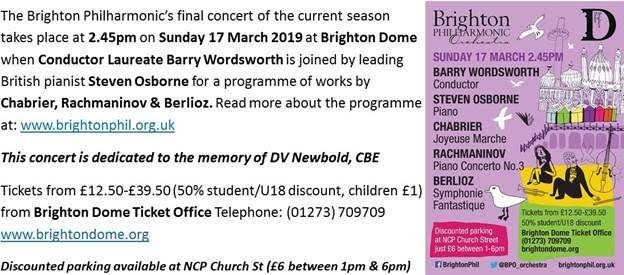Brighton Philharmonic Orchestra, Sunday 17 March, 2.45pm, Brighton Dome Concert Hall
Barry Wordsworth – Conductor
Steven Osborne – Piano
For the last concert of this our 94th season the Brighton Philharmonic Orchestra, with Barry Wordsworth conducting, are performing a brilliant late Romantic piano concerto and a masterly symphony that tells a story in music. To start the afternoon off we are playing an overture that gives the game away in its title – Joyeuse Marche.
For Rachmaninov’s 3rd Piano Concerto we welcome back the Scottish pianist Steven Osborne who, on the 9th April 1989, won the inaugural Brighton Piano Competition. Steven has since played with Barry and the Brighton Phil a further four times and is now one of the country’s most influential and brilliant pianists – equally at home in the recording studio and on the concert platform. Steven has recorded a CD of Rachmaninov’s music (Études-Tableaux Op. 33 and Op. 39) which was released by Hyperion last July – CDA68188.
Born in 1873 Rachmaninov completed this piano concerto in 1909 whilst living in Dresden. The concerto quickly became both loved and feared in equal measure amongst pianists, and has now gained the reputation of being one of the most technically challenging piano concertos in the standard repertoire. It also cemented Rachmaninov’s reputation as one of the finest of the late Romantic composers.
The concerto’s first performance was in New York with Rachmaninov as soloist; he had practiced it on a silent keyboard as he travelled by boat from Europe to America. The second performance, a few months later in 1910, was with Gustav Mahler conducting – an experience that Rachmaninov treasured greatly.
Hector Berlioz’s Symphonie Fantastique or to give it its full title, An episode in the life of an artist in five parts, was written in 1830 and its first performance was later that year in Paris.
The symphony is vaguely autobiographical and the first movement Rêverie is the artist falling desperately in love, which in turn creates all forms of passions, aimless joy, fury, jealousy and complete tenderness. For the second movement Un bal the artist is in the tumult of a festive party, contemplating the joy of nature everywhere, in the fields and in the town – but at all times he is troubled by the haunting image of his love. In Scéne aux champs, the third movement, the artist hears two shepherds calling in the distance and with the rustle of trees his heart is momentarily healed, but then the brooding melancholy of loneliness and betrayal causes dark premonitions. At the end the shepherd calls again, but the other one does not answer, adding to the artists despair. In the fourth movement Marche au Supplice the artist is convinced he is betrayed – he tries to poison himself but only falls into a deep sleep, where he dreams he has killed his beloved and sees himself being taken to the scaffold to witness his own execution. The last movement is Songe d’une nuit du sabbat – the artist sees himself at his own funeral in the midst of witches, sorcerers and monsters. He sees his love entering the party and the grotesque scene unfolds as the funeral bell tolls and we end with the dance of the witches combined with the Dies irae.
We open this, our last concert of the season, with a very popular overture by the French composer Emmanuel Chabrier, who wrote his Joyeuse Marche initially as a piano piece, orchestrating it later in 1888. It was premiered in Paris in 1889 with the composer conducting and was enthusiastically received, remaining a concert favourite ever since.
Our concert is dedicated to the memory of DV Newbold, CBE, a staunch and generous supporter and sponsor of the orchestra for many years who passed away last March at the age of 91.
Tickets from £12.50-£39.50 (50% student/Under 18 discount, children just £1) available from Brighton Dome Ticket Office, (01273) 709709, www.brightondome.org
Discounted parking available in NCP Church Street Car Park – just £6 between 1pm and 6pm. Simply park as normal and collect a follow-on ticket at the concert to receive the discounted rate.

